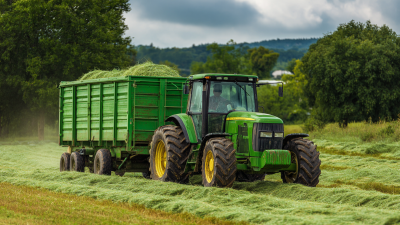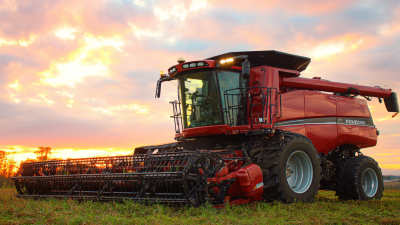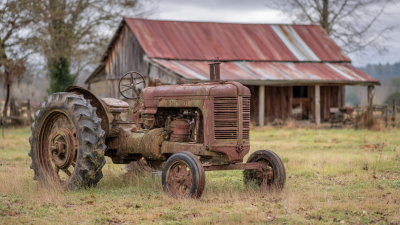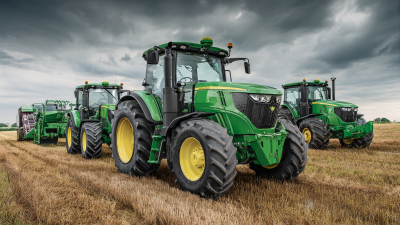As the world faces increasing challenges related to climate change, food security, and environmental degradation, the future of sustainable farming has become a pressing concern for both farmers and policymakers alike. With the advent of advanced farm equipment, the agricultural industry is poised to undergo a profound transformation that prioritizes sustainability without compromising productivity. Innovations such as precision farming tools, autonomous tractors, and smart irrigation systems play a crucial role in optimizing resource use and minimizing waste. This shift towards more eco-friendly practices not only enhances the efficiency of farming operations but also supports the broader goal of maintaining healthy ecosystems. By integrating cutting-edge technology, farmers can effectively reduce their carbon footprint while ensuring that the demands of the growing global population are met. The convergence of sustainable practices and advanced farm equipment may well define the future landscape of agriculture, paving the way for a resilient and environmentally responsible food system.

The integration of advanced technology into farming practices is revolutionizing the agricultural landscape, paving the way for more sustainable and efficient methods. Precision agriculture, driven by data analytics and IoT devices, enables farmers to monitor soil health, crop conditions, and pest threats in real time. According to a report by Markets and Markets, the global precision farming market is projected to reach $12.9 billion by 2027, reflecting a growing recognition of technology's role in enhancing sustainability. This level of insight allows for better resource management, reducing water and fertilizer usage by up to 30%, while simultaneously boosting crop yields.
To optimize sustainability in farming, consider investing in equipment that utilizes GPS technology for field mapping and variable rate application. This allows for more strategic use of inputs, significantly minimizing waste. Furthermore, implementing drones for crop monitoring can identify problem areas more efficiently, leading to targeted interventions that conserve resources and improve overall productivity.
Tip: Regularly assess your technology needs and explore options that incorporate renewable energy sources, such as solar-powered farm equipment, to further reduce your environmental footprint. Embracing these advanced tools not only contributes to sustainable farming but also enhances long-term profitability.
Precision agriculture represents a transformative approach to crop production, significantly enhancing sustainability in farming practices. By utilizing advanced technologies such as GPS, drones, and soil sensors, farmers can collect detailed data about their fields. This wealth of information allows for targeted interventions, ensuring that water, fertilizers, and pesticides are applied only where needed. Such precise resource management not only minimizes waste but also reduces the overall environmental impact of agriculture.

The economic benefits of precision agriculture further reinforce its eco-friendly credentials. By optimizing inputs and improving crop yields, farmers can achieve greater profitability while adhering to sustainable practices. This method supports the notion of responsible farming, where ecological health is prioritized alongside productivity. As technology continues to evolve, the integration of precision agriculture techniques will play a crucial role in meeting the growing global food demands without compromising the environment.
The integration of renewable energy in modern farming equipment is pivotal for the evolution of sustainable agriculture. As farmers increasingly rely on advanced technologies, innovative systems like solar-powered irrigation and biogas-driven machinery have emerged. These advancements not only reduce reliance on fossil fuels but also significantly lower greenhouse gas emissions, aligning agricultural practices with environmental sustainability goals.
In 2025, we are witnessing a transformative shift where more than 75% of new agricultural machinery features autonomous navigation systems, which enhance precision in farming operations. This technological integration enables better resource management, ultimately resulting in improved yields while minimizing environmental impact. Furthermore, the utilization of green hydrogen in farming is gaining momentum, with strategies aiming at a substantial reduction in emissions, showcasing the potential of renewable energy to revolutionize farming efficiency in various climates, even in challenging arid environments.
This chart illustrates the expected adoption rates of various advanced farming equipment integrated with renewable energy sources over the next five years. The data reflects the growing trend towards sustainable practices in agriculture.
The integration of smart machinery into sustainable farming practices significantly enhances resource efficiency while minimizing waste. Advanced farm equipment, equipped with cutting-edge technologies such as precision agriculture tools, GPS mapping, and IoT sensors, allows farmers to monitor and manage their resources with remarkable accuracy. For instance, these technologies enable the targeted application of water, fertilizers, and pesticides, ensuring that inputs are used only where and when they are needed. This not only conserves natural resources but also reduces the environmental footprint of farming operations.
Additionally, smart machinery facilitates better data collection and analysis, empowering farmers to make informed decisions. With real-time insights into crop health, soil conditions, and weather patterns, farmers can optimize their farming strategies for maximum yield and sustainability. By reducing excess application and waste, these advanced tools help to lower operational costs and promote a healthier ecosystem. As the agriculture industry continues to adopt such innovations, the overall impact is a more sustainable and efficient approach to food production, aligning with the growing global demand for environmentally responsible practices.
| Farm Equipment Type | Resource Efficiency (%) | Waste Reduction (%) | Initial Cost ($) | Maintenance Cost (Annual $) |
|---|---|---|---|---|
| Precision Seeder | 85 | 60 | 3,000 | 300 |
| Automated Irrigation System | 90 | 50 | 8,000 | 500 |
| Drones for Crop Monitoring | 75 | 40 | 1,500 | 200 |
| Smart Fertilizer Applicator | 80 | 70 | 4,500 | 400 |
| Robotic Harvesters | 88 | 65 | 12,000 | 800 |
The future of sustainable farming is increasingly intertwined with advancements in farm equipment that prioritize environmental stewardship. Innovations such as precision farming technologies, which utilize GPS and IoT sensors, allow farmers to optimize resource use, minimize waste, and enhance crop yields. This shift not only improves economic viability but also significantly reduces the carbon footprint of agricultural practices. The integration of data analytics enables farmers to make informed decisions, ensuring that inputs like water, fertilizer, and pesticides are used more efficiently.

In addition to precision farming, the rise of electric and autonomous machinery is set to transform the landscape of sustainable agriculture. Electric tractors and drones are emerging as eco-friendly alternatives to traditional fossil fuel-powered equipment, leading to lower greenhouse gas emissions. Furthermore, automated technologies enhance operational efficiency by minimizing soil compaction and disrupting natural ecosystems less. As these advanced tools become more widespread, they offer the potential to create regenerative farming cycles that restore soil health and biodiversity while meeting the growing global food demand sustainably.





